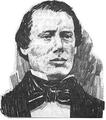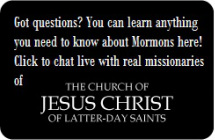 As a missionary myself, I have on several occasions pondered about the great men and women who came before me, who for a season gave their lives to the Lord to bring about His great work. Indeed, throughout the history of Mormonism, there have been over a million brave souls who have sacrificed their time and efforts in some capacity on the Lord's errand. Though the message has stayed the same, since the beginning of LDS missionary efforts, there have been many changes and developments in the way missions are conducted, who is called to serve, and how the message of the gospel is shared.
 Samuel H. Smith (right), the younger brother of LDS Church founder and Prophet Joseph Smith, is regarded by many as the first full-time missionary of the Church. He served many missions for the Church throughout his lifetime, but in his first one to Mendon, New York, he encountered one John P. Greene, giving him a copy of the Book of Mormon. Greene would eventually be baptized into the LDS Church, and so would his brother-in-law, Brigham Young, who would go on to become the second Prophet of the Church.
From Mormonism's inception in 1830, many missionaries were called to preach throughout the eastern U.S., but the official structure and organization of the missionaries took hold in 1839, when the New York City Mission was officially organized, John P Greene being called to preside over it. Greene would be in charge of all the missionaries in that area, delegating necessary duties, and acting as a liaison between the missionaries and the Church leaders. A similar structure still exists in modern missions though each area has its own specific needs and challenges, necessitating some minor variances.
The early history of Mormonism (much of the nineteenth century) saw an increase of missions throughout what is now the United States. Missions sprung up from coast to coast, with missionaries serving in the eastern states, preaching to the Cherokees of Oklahoma, all the way to California. There were even some elders sent to the Hawaiian Islands.
The work exploded in the mid to late 1800's and even more so at the turn of the twentieth century. Early on, the Church established the British mission, but didn't expand across Europe until after the Saints had arrived in Utah in 1847. Gradually the Church's mission force would obtain the reach it has today, with missionaries in most of the countries of the world, only blocked from those nations which outlaw either religion and/or proselytism. They continue this day to bring the fullness of the Gospel of Jesus Christ to God's sons and daughters all over the world. It is indeed a thrilling privilege to take part in such a legacy.
 Since I was but a wee lad, I've always loved, loved, LOVED Christmas. Though perhaps my reasons for this love have evolved over the years, the season just fills me with an almost childlike giddiness. Much of Christiandom yearly celebrates this veneration of Christ, and my faith ( Mormonism) is no exception. Though Mormons don't really do anything vastly different than other Christmas celebrators, it's hard not to bring up the development of my own personal fledgling faith in connection to the Christmas spirit. Like most American children, I was taught of the mystical Santa Claus, who lived at the north pole, was morbidly obese, and brought presents to all the good children of the world. It was a whimsical, if silly, legend that was lots of fun to take part in each year. But I'm forever grateful that my parents, while happy to entertain our young minds with Santa, always drove home the real reason we were giving gifts to one another . Every Christmas morning, before rushing downstairs for the merriment, my mom and dad would always gather the family into one room, and we'd kneel on the floor and say a prayer to God, thanking Him for this joyous holiday which allowed us to commemorate the birth of our Savior Jesus Christ. The non-Santa aspects of Christmas have always carried with them a weight of reverence, and they have inspired my faith from the very beginning. I have nothing against those who do not celebrate Christmas. But it always bothers me a bit when otherwise deeply Christian people seem so jaded with the whole experience. It's gotten to the point of cliche for people to declare their hate for the holiday. Perhaps those people have legitimate reasons for their distaste for the season, but I wonder if their aversion would be better directed at particular aspects and traditions of Christmas, rather than discounting it altogether. So companies are exploiting Christmas for commercial reasons? You don't have to. So you have to spend it with an annoying distant relative? Buck up, and remember that experiences can only be positive when you bring the right frame of mind. Not to point to myself as a wonderful example, but if ever I feel myself displeased with some hassle of the season, or disappointed with some yuletide experience, I quickly remind myself of the Babe in Bethlehem, my Lord Jesus Christ. I try to emulate his example of giving, love, and gratitude. Surrounding myself with whatever family and friends that are available, I joy in the high spirits and laughter that Christmas can bring, if only we let it.
|




 RSS Feed
RSS Feed